- Home
- Sarah Zettel
Kingdom of Cages Page 2
Kingdom of Cages Read online
Page 2
“If we knew Pandora was doing everything possible to help put an end to the Diversity Crisis, we just might,” replied Commander Poulos.
“So…” Father Mihran groped for his chair and sat down heavily. “If we refuse, we have the choice of the Authority destroying us or the Authority allowing us to be destroyed.”
“Your people aren’t the only ones who learned the lessons of the pillage of Old Earth.” Commander Poulos touched her ring and blanked out the image of the burned ruination. “If we don’t move now, we will lose our chance.”
Father Mihran dropped his gaze to the council. There should have been argument. There should have been raging debate. The whole family should have been called in. The city-mind itself should have raised its voice.
But none of this happened. There was only silence, until Father Mihran spoke again.
“It will take time.”
Commander Poulos inclined her head once. “We know.”
“Do you?” snapped Father Mihran. “I am not speaking of months. I am speaking of years. Possibly decades.”
“We know,” the commander repeated. “That is why we are here now, while we still have decades, perhaps even as much as a generation.” Her face grew hard, and Tam knew she was seeing disasters that were to her at least as horrible as the crater she had opened in the Vastness. “There will be too much suffering, but there will be survivors. We’ll be able to start over.”
Father Mihran opened his mouth and closed it again. “Which world’s generation are you picking for our clock, Commander?”
The small, grim smile returned. “Why, Pandora’s, of course.”
Tam felt it then, the dizzy sensation of watching something begin to slip away, like a leaf in a stream, and knowing with terrified certainty that it was one of a kind, and when it was gone there would be no more. Everything changed today. His world, his life, his vision for his future, everything, it all slid farther away with each heartbeat.
He also knew that this feeling, like the image of the Vastness crater, would never leave him. The Authority had won. They had let the Authority win. With their single act, Commander Poulos and her people had altered the lives of every human being living on Pandora.
And the Pandorans, in turn, would change the entire world, whether they wanted to or not.
Part One
The New World
CHAPTER ONE
A Mud Hut in the Jungle
It was late when Tam finally left the experiment wing and crossed Alpha Complex’s central lobby. Outside the dome, the sky’s summer sapphire hue had deepened to indigo, and the first three stars shone over the forest, which stretched its long shadow across the marsh toward the Alpha Complex. Silhouettes of wading birds—paddlers, skimmers, and shimmies—stood stark and still in the peach and fuchsia light.
The beauty of the sight stopped Tam. He leaned on the railing in front of the triple-insulated windows, giving himself a minute to watch the marsh’s many dances. Fish and insects rippled the water. Bats skimmed overhead. One of the wading birds stabbed its beak into the water and came up with a patch of darkness, maybe a frog. Snap! The meal was done and the bird strutted away.
It might have been Old Earth out there. It almost was. Pandora was one of the few worlds to score a perfect ten on the Almen Compatibility Scale.
The scene tugged at Tam. He wished, as he had on a thousand other evenings, that he could walk out of the complex with its pillow dome, insulation, sealed portals, and water-cooled walls. He would step into the pink and lavender glow of the sunset, onto one of the marsh’s tiny islands, and watch the water birds in their thousands take flight all around him.
Oh, Tam spent a great deal of time outdoors, in the villages for which he was administrator, but those were fenced and protected areas, not the pristine wilderness, not what he saw through the window. That beauty remained forever out of reach, past the glass, past the fences.
Just once, Tam thought. What could it hurt?
Years of conditioning raised a surge of guilt in him at the thought, and that guilt activated his Conscience implant.
Are you looking out the window, Tam? it asked him. Are you thinking of walking in the marsh?
The Conscience implant couldn’t actually read thoughts, but it could measure the presence of chemicals indicating anxiety, or guilt, and ask probing questions. Tam took a deep breath and tried to concentrate on the world inside, on his home and family. This time he was not successful. His Conscience tasted the continuing guilt in his mind and knew its guess was right.
We’d be no better than the ones who tear their worlds apart and try to turn them into farms. Pandora must be protected.
Tam shook his head. “Yes, yes, I know,” he murmured to his Conscience. “I’m not going to break out. Really.”
It was dark enough outside that Tam could see his own reflection in the window glass. It showed him a spare man, whose black trousers, white shirt, and white-on-white patterned vest hung on him as if he’d lost a lot of weight recently. His medium brown skin was still clear, but his thick black hair swept back from a high forehead that showed the lines of age and worry. His dark eyes set above his Roman nose sagged tiredly at the corners.
It had been ten years since the meeting in which the Authority had bullied Pandora into seeking answers to the Diversity Crisis, the death that stalked across the Called. But after ten years of experiments, analysis, and gathering more data than could ever be used, their theory of how to produce a universal cure was still just theory.
The Authority was getting restless. The failure of the second delegation to Earth had only made that restlessness worse. The Authority might say they were no government, that they were just merchants and go-betweens, but they knew their future was bound completely up in the future of the Called, and they were not going to let that future go.
A new reflection moved in the glass. Tam focused on the translucent image and saw that a thin young man had come to stand behind him. The man’s pale skin, white tunic, and white-striped trousers stood out sharply against the background of ferns and drooping tropical greens in the big bubble terrarium that dominated the center of the lobby.
“Basante. You’re all I need right now,” Tam whispered aloud, almost without realizing he was doing it. That is one of the problems with Consciences, he thought to himself. You end up talking to yourself a lot.
Basante is part of your family, Tam’s Conscience reminded him.
Maybe he’ll go away. Tam looked past their reflections to what he could still see of the marsh. The thumb-sized luminescent flies their ancestors had nicknamed will-o’-the-wisps danced over the waters and dotted the reeds, as if the stars had come down to play.
A fanciful image. Tam smiled softly to himself.
Tam focused on the reflections again. Basante was still there. In fact, he looked ready to wait all night.
Nothing else for it, then. Tam turned. “Good evening, Experimenter Basante. I thought you were retiring for some private time.” They both had spent all afternoon and most of the evening hearing the report of the latest delegation to the Called. Their conclusions were as expected. Trying to find a cure for the Diversity Crisis one planet at a time would involve making massive changes to each planet’s biosphere for the sake of its human inhabitants, which was completely unacceptable. Father Mihran had told them all so before they left.
“It is bad enough that we will be enabling the colonists to continue to destroy the natural and native life of their worlds. We will not turn our own hands to that destruction, any more than we would begin to destroy Pandora.”
Which meant only one thing. If the worlds could not be changed, the humans would have to be.
“I had hoped to get to bed early.” Basante stepped forward. “But this is urgent.”
Without waiting to be invited, he pressed his palm over the back of Tam’s hand. Tam glared at him. He also, however, looked at the back of his hand to see what data had been transferred to the display.
>
The miniature screen shone with the colored lines that made up a gene scan. Tam’s practiced eye read it as clearly as if it had been the alphabet, and he felt his eyebrows rise.
Tam looked up from the scan. “Is this one of ours?”
“Not yet,” said Basante. He had a grin on his face, as if he had produced the gene alleles by himself from a dish in his lab. “She’s being processed for immigration right now.”
Tam felt his mouth tighten into a frown. Basante’s enthusiasms were reason for caution. As of this afternoon, his project, the Eden Project, had suddenly become the chosen means of curing the Diversity Crisis. However, Basante, like the other experimenters, was too apt to see the subjects of his experiments as spare parts and forget that they were as human as the family. “Have we asked her to volunteer for the project yet?”
“Do you want to take the chance she’ll say no?” Basante actually looked surprised.
Tam’s frown deepened and his gaze turned sour. Recognizing that a negative answer was on the way, Basante held up his hand. “Normally I’d agree with you.” Basante had sat with Tam in history lessons. He knew that even villagers could be pushed too far, and this woman was a stationer. “But this one is too important,” Basante barreled on, gesturing to the gene scan. “She’s within three or four points of perfection. We’ve been having the Authority sweep the Called for this configuration, and here she is, practically delivered to us.”
Tam ran a thumb over the back of his hand, wiping the scan from his display. “We will ask her to enter voluntarily. We can make a good offer. But we will let her immigrate no matter what she says.”
“And if she does say no?” Basante folded his hands behind his back.
“Then at least she’s down here with us, and about to have all the usual problems station people have in the villages. We will make our offer again.” Tam turned away, then he turned back again. “If I find out you or anyone else has forced her into the project, I’ll have you standing up to explain yourself before the family, including Senior Committee.”
Tam walked away from the windows and through the connector hallway, with its aquarium walls. Sunfish and koi looked briefly out at him between green clouds of algae and then went about their own business.
He hoped he had been clear enough. With Basante, one never knew.
Outside, I wouldn’t have to worry about any of this, he thought, before he could stop himself. The guilt rose, and must have tasted familiar to his implant. He’d been giving it a lot of practice lately.
Earth, his Conscience said. I want you to think about what happened to Earth.
Then it seemed to Tam he smelled ozone and sulfur, and everything he had ever learned about Earth came flooding back to him. Earth, the birthplace of humanity, with its endless sprawl of buildings tied together with roads and tubes and rails, its red tides, and rivers that ran slick and hot with waste from the power generators and factories. He remembered studying the diagrams of the water processors and the earth processors and the people in their protected habitats, and all the vast machinery that was needed to ensure the continuance of human life on a world where the only green left was the miles and miles of corn and soybean fields that fed all those people.
He remembered the video composites of the people in their boxlike homes, taking their medicines and monitoring their blood chemistry and receiving news reports about the latest longevity discoveries and treatments and the progress that was being made in reseeding the oceans with fresh kelp to help create more oxygen for them to breathe during their long, propped-up lives, which had destroyed the world they did not understand. Around them, that same world struggled not to die, while its oblivious children lived on in shells of stone, bacteria, and artificial gardens.
“But is it true?” murmured Tam to the memories and his Conscience as he took a deep, steadying breath. It was hard to ask the question, but he had to. Without it, he would just accept, which was the one thing he could not do. If he did, it would mean everything his parents had tried to do for him and for Pandora was over. It would make him worse than his birth sister Dionte, with her scheming and her excesses. “Or is it just what you and I are supposed to believe?”
It is true, answered his Conscience. You know it is true.
“Yes,” Tam breathed with a sigh. It was the approved answer. It would shut his Conscience up and give him time to think for himself.
Satisfied, the implant lapsed into silence, and Tam started walking again, hands folded behind himself, trying to be content with the sight of fish on the one side and drooping ferns on the other.
Once, the Conscience implants had just been communication devices connected to personal data displays. They accepted subvocalized commands, monitored physical health, and assisted with data reduction and sorting. They followed the orders of the ones who carried them. But that was long ago, and now they were also personal guardians, making sure all members of the family remembered who they were and what they owed to their family, and to Pandora.
With room in his head to think his own thoughts again, Tam turned back to his conversation with Basante. It was very clear that Basante wanted this immigrant woman in the experiment wing. He probably wanted her in the involuntary wing, where he wouldn’t have to bother explaining things to her.
Tam wondered abruptly if Dionte knew about this woman. Probably. Basante was wedged very tightly into her plans and saw very much through her eyes.
Tam hoped the woman was smart and strong. Otherwise, both Bas-ante and Dionte could quite easily get what they wanted.
Chena Trust lay awake in the darkness, blinking at a thick, blank, silent wall.
After a few million seconds of this, she rolled over on her back and listened. Beyond the breathing, rustling, snoring people, she heard another world. It chirruped, peeped, and murmured with a whole set of rhythms that followed no pattern Chena could make out. It was nothing like their home on Athena Station, which she, her little sister, and their mother had left a week or so ago. On the station, she could tell what was happening in the world by the clicks, creaks, and whooshes that filtered through the ancient walls. Here, it was just noises all piled up on top of each other.
Chena burrowed under her covers, but sleep didn’t come back.
What are you afraid of? she asked herself. You’re here now. It’s stupid to be scared of the place. You’re not going back.
She wanted a light, an info screen, and a jack for her wrist comptroller, so she could find out something about this place she was in, but none of that stuff existed here. The walls stared back at Chena, blank, immutable, silent. Everything she knew was up in the sky somewhere—the curving, insulated hallways with their cameras and input screens, the kilometer-long spiral staircases, which were always too cold or too hot and forever too loud no matter how much sound damping they’d put up, their tiny apartment with its peeling carpet—these were all the past. And the future…
Was the future really a mud hut in the jungle? That was what Eng and King said. Chena poked her head out from under the covers again.
“They give you a spear and make you hunt things.” King had hopped around grunting, with a big grin on his face, like he thought he was doing a public service. “You’re going to look real sweet swinging from a vine, Chena. This is how you’re going to look.” He grabbed a corner bracket and let himself swing back and forth until the caution alarm buzzed at them, with Eng laughing that stupid horsey laugh of his the whole time.
They can both just piss off. What do they know? They were born on Athena too. They just know what they see on the screen. Chena scratched at the gauze bandage sealed to the back of her hand. This place isn’t mud. It’s stone and wood. It isn’t anything like mud.
Mom wouldn’t really make them live in the jungle. She wouldn’t do that to them. This was just a temporary stop. They’d move someplace real in maybe a week or so. Mom had a job. They weren’t going to stay here.
Chena rubbed the bandage harder. Her skin still s
tung where they had inserted the new ID chip and then imprinted a multibranched tattoo on top of it. All that had been done by the same woman in white overalls who’d spent the morning quizzing Chena. Where was she from, what did she weigh, what did she eat, how often had she been sick, was she sick now, how did she do in school, did she go to school, or did she just learn off the computer? Where did they live on Athena, had they always lived on Athena? Who was her mother, her father, her grandparents, her aunts and uncles and cousins…?
When she couldn’t answer all the questions, especially the ones about her family, the woman in white overalls looked disgusted, pulled out a syringe, and gestured for Chena to hold out her arm.
But they’d finally had enough of that and had put her in a sterile-walled waiting room already filled to bursting with people—men, women, kids, and babies, none of whom had been in the car on the space cable that had brought Chena and her family down to Pandora, and none of whom smelled like they had shower stalls in their apartments. Their old apartments. All of them were immigrants, like she was now.
It had been about an hour before whoever was giving Teal her going-over let her into the waiting room too. Teal had been scared, of course, but at least she didn’t look like she was ready to cry, which she would have if this had happened even just last year. Chena grabbed Teal’s hand and peered around through the crowd, looking for someplace where they could stand. A pair of old men in orange overalls that looked ready to fall off their skinny bodies shuffled sideways and gestured to Chena that she could stand by the wall. Chena nodded her thanks and steered Teal toward the empty spot.
Chena leaned against the wall, and so did Teal, but she collapsed her knees until she’d slid all the way to the floor.
Chena looked down at her younger sister for a long moment. Teal had just turned ten. She looked like Mom. Everybody said so. She had Mom’s sandy brown skin and high round forehead, black hair that fell back in waves around her ears. She had Mom’s shining brown eyes, and was stocky like Mom was too, with square hands but round legs.

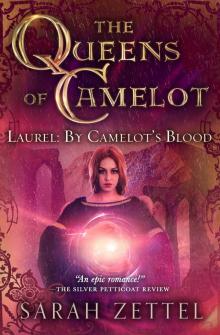 Laurel
Laurel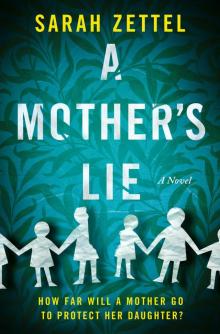 A Mother's Lie
A Mother's Lie Playing God
Playing God Dust girl
Dust girl Sword of the Deceiver
Sword of the Deceiver Let Them Eat Stake: A Vampire Chef Novel
Let Them Eat Stake: A Vampire Chef Novel Dust Girl: The American Fairy Trilogy Book 1
Dust Girl: The American Fairy Trilogy Book 1 The Usurper's Crown
The Usurper's Crown For Camelot's Honor
For Camelot's Honor Camelot's Blood
Camelot's Blood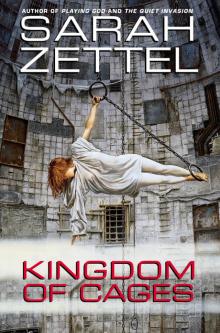 Kingdom of Cages
Kingdom of Cages Fool's War
Fool's War Golden Girl
Golden Girl A Sorcerer’s Treason
A Sorcerer’s Treason The Firebird's Vengeance
The Firebird's Vengeance A Taste of the Nightlife
A Taste of the Nightlife Assassin's Masque (Palace of Spies Book 3)
Assassin's Masque (Palace of Spies Book 3)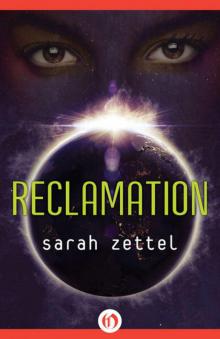 Reclamation
Reclamation Bad Luck Girl
Bad Luck Girl Under Camelot's Banner
Under Camelot's Banner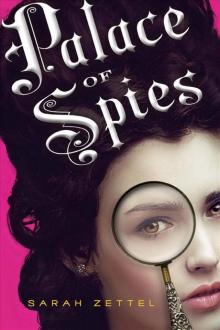 Palace of Spies
Palace of Spies Dangerous Deceptions
Dangerous Deceptions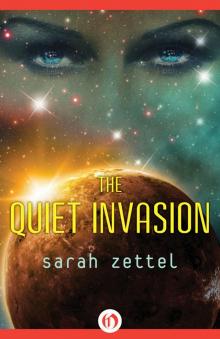 Quiet Invasion
Quiet Invasion In Camelot’s Shadow: Book One of The Paths to Camelot Series (Prologue Fantasy)
In Camelot’s Shadow: Book One of The Paths to Camelot Series (Prologue Fantasy)